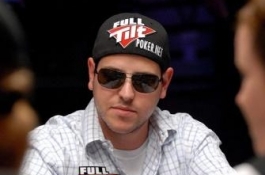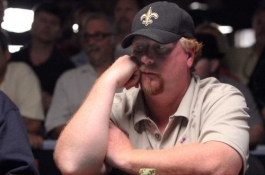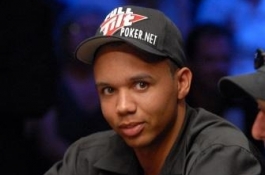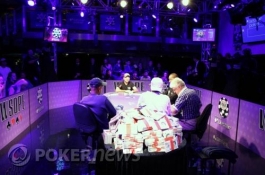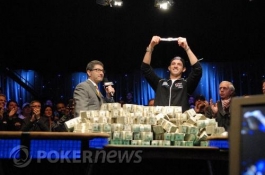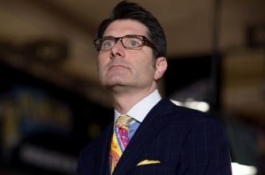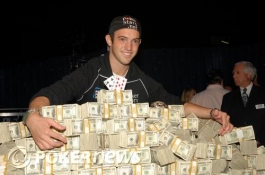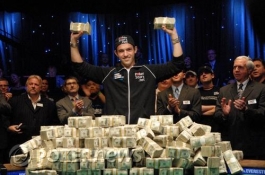Darvin Moon vs. Billy Kopp: The $45 Million Dollar Hand Revisited
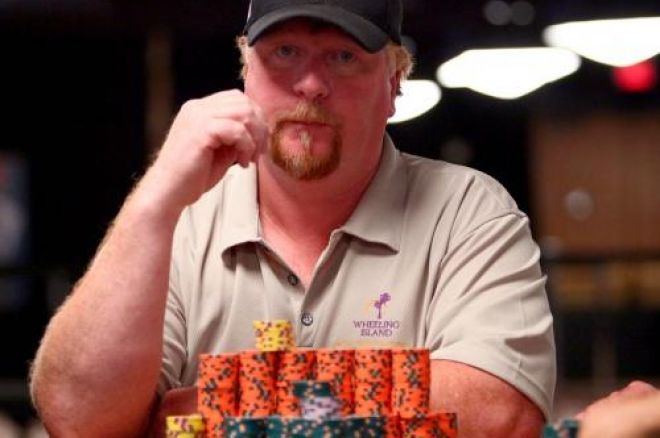
With last nights episode of the World Series of Poker airing on ESPN we finally got a chance to see the huge hand where Darvin Moon flopped a flush against Billy Kopp's smaller flush. The hand ended up costing Kopp a chance at the final table. Matt Waldron, a fellow journalist from LifesaBluff, was gracious enough to share a piece of an interview he conducted with Moon about the hand in question, among a few other things. It's interesting to note that Moon believed the board was not paired when he made the all-in call on the turn, when in fact last night's episode indeed pointed out that PokerNews' own coverage of the hand, which Moon disputed was in fact correct. The board was indeed paired on the turn.
I wanted to ask a few things about a couple of key hands there. I think the one toward the end that everybody��s been kind of focused on is the one with Billy Kopp in which he managed to get it in with a five-high flush and you called with a queen-high flush, that both of you had flopped. Now, in everything we really talked about, you said "I��m just an extraordinarily tight player, I got really lucky, the deck hit me over the head," but in that situation, we had a spot where the board had paired and it was possible that your second nut hand wouldn��t be good. Because his activity wouldn��t really say, ��Oh I��ve got a great hand,�� it could be something completely different and you could have been making a huge misstep that a "super tight" player might have laid down. So how did that go down and how were you able to make that call?
The board wasn��t paired when I made the call.
The reporting I'm reading (PokerNews) said that the second deuce had hit the turn.
No, that was his second deuce. He had two/five in his hand.
Oh, okay.
The flop comes K?9?6?, and the turn was a deuce of hearts 2?, and that gave him a pair of deuces, but the board never paired.
Ah, okay. So then you are saying what was in there is wrong. That it has been misreported?
The only thing that could have beaten me was an ace-high flush, and he raised my big blind probably six or eight times in a row, and I folded down every time. I had some bigger hands than what I called him with, but I folded because there��s other people who would call his raise and I wanted to see what was going on there. So I'd just fold down and watch what he��s raising me with, trying to steal my blind with, at the end of each hand. And fold down the rest of them, and I got a read on what he was folding out of and the expressions he was getting whenever he would raise or somebody else called, so I mean, I got a read on him when he didn��t have a strong hand if he got called. So when it came around to me, and I had Q? and J?, I call and I got the same expression as before, so I knew he wasn��t real strong. I knew he didn��t have an ace. That��s what someone said, ��How can you put all your chips in the pot, not knowing he don��t have an ace. Well, I would have bet you $800K that I was up to, that he didn��t have the ace, because of what I��d seen. When I said I called, I was watching him, (and) I had him.
And that was just done like that. The other [hand] kind of plays to what you were telling me. You called a reraise from a really active younger guy out of the blinds. And just flopped top set in position and just was a pretty easy call off right there.
Well, I wouldn��t have called him if the guy didn��t raise his big blinds. There��s another guy in the hand in between. I think it was Smith that last one knocked out?
Right, right.
I was the little blind, he was the big blind, and the guy in seat eight raised a little bit. So I called his raise and then when it come back to Smith, he raised 1.2 million, so now there is 6 million. I was getting between 5:1 and 6:1 on my money to call his 1.2 million chip raise. Because then the other guy folded, so it��s just between me and him heads up. I got 44 million, I��m gonna call it and see if I can hit a set. If the other guy would have raised more, or [Smith] would have raised more, I��d have got out. I wouldn��t have even stayed in that hand. I thought you were getting the right money for the chip stack you have to try and hit a set and I got lucky. I mean everything I got, in a pot where I didn��t have a real strong hand, the flop helped me. Every time I got in a pot with a strong hand, the flop didn��t hurt me. Pocket aces, pocket kings, the flop come 2,3,9.
So you never got it in unless you��re pretty sure you��re okay there.
Yeah, I mean the flop either helped me when I wasn��t real strong and it didn��t hurt me when I was strong, so I felt comfortable with every hand I played, and I didn��t play a whole lot of hands.
And that leads me to the next thing. I mean, people have kind of, and I��m sure Billy Kopp is kicking himself in the ear about this, quite a few times, but how do you make that hard of a play on a guy that has literally barely played a hand and has never made a move as far as anybody can see.
I don��t know. I just think it was one hand. The whole tournament he played perfect poker up to there and one hand got away from him and it��s sad that it cost him $400K. He walked away with eight hundred and some thousand and could have walked away with $1.2 million. That one hand cost him.
And he could probably fall asleep at the final table and make it to third or fourth with that chip stack.
Yeah. That��s what I told everybody back home. They said how you going to play when you get back, I said I��m going to be tighter then I was the first eight days. You know I can blind out and move up in the money. And we��re not talking about moving up a little at a time. Each guy goes out, you move up a couple hundred thousand.
PokerNews will be at the World Series of Poker Main Event Final Table this weekend giving you the action as it happens. Follow it at the PokerNews Live Reporting Page and be sure to follow us on Twitter.

